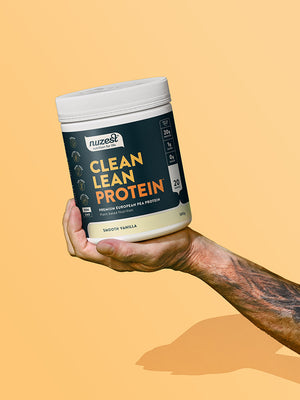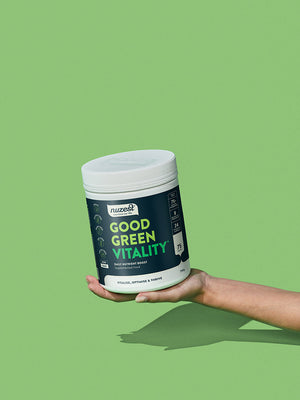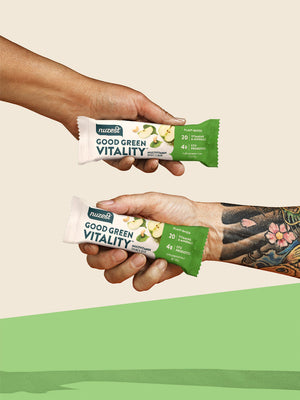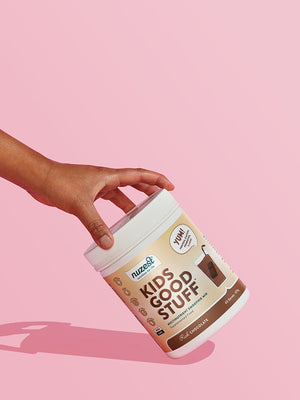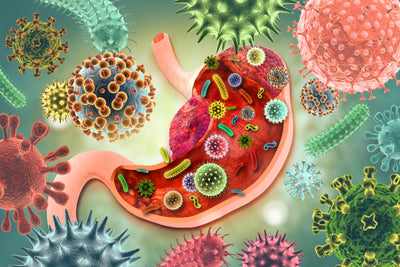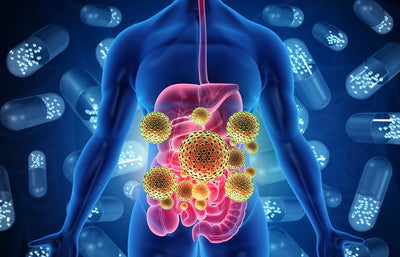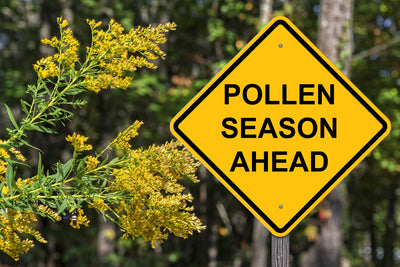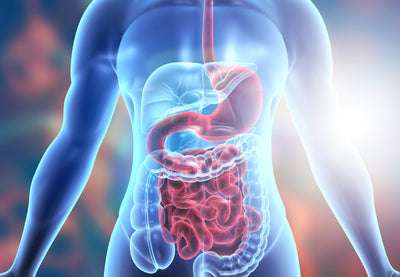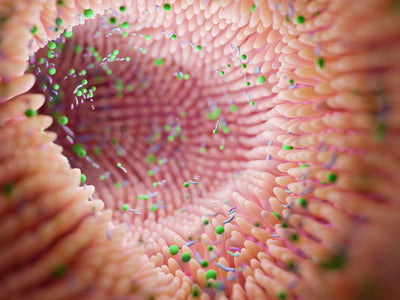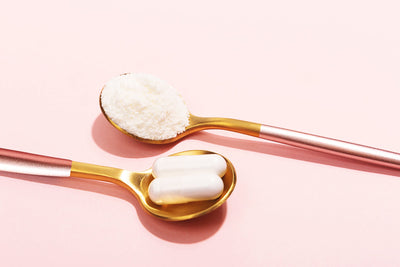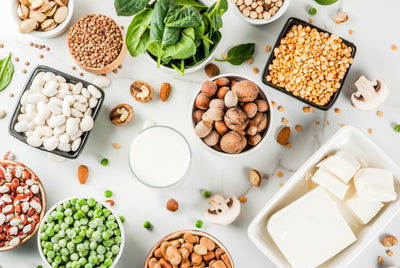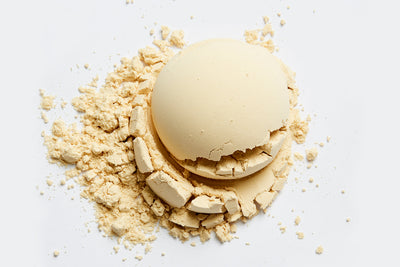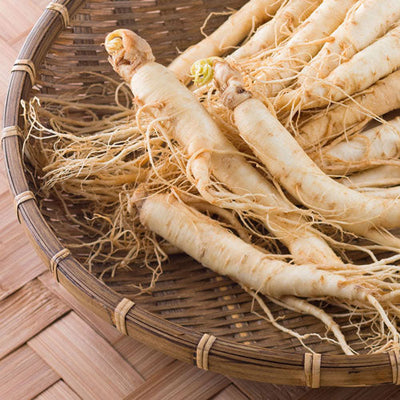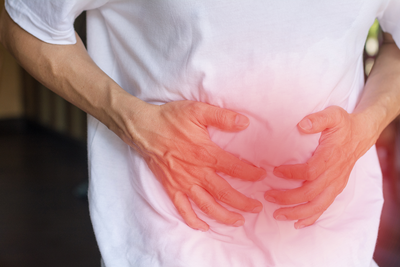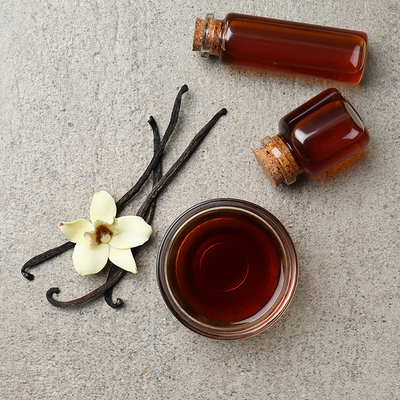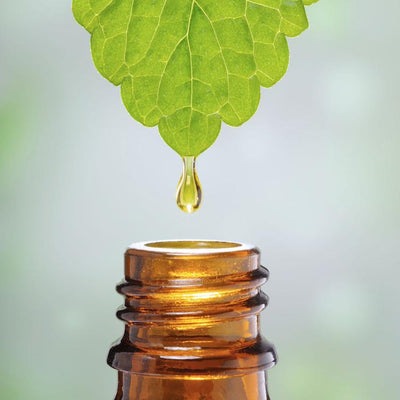
11 min read
How Digestible is Pea Protein?
Posted By
Caitlin Turner
Pea protein isolate is an increasingly common protein supplement due to its purported ease of digestion and high quality.
But how digestible is pea protein really?
Clinical Nutritionist & Researcher Cliff Harvey breaks down the science to explain.
Protein digestion and why it’s important
Digestion refers to the process of breaking down substances (from food) to forms that can be absorbed into the body for use. It is now commonly accepted that differences in protein sources are relatively minor and that the most important consideration is to consume (and absorb!) enough protein for optimal health and performance.
What can affect digestibility in real life?
Antinutrients
Phytic acid
Phytic acid stores phosphorus in grains and legumes. Because humans lack the phytase enzyme to break this compound down, we cannot absorb the phosphorus from phytic acid1.
While phytic acid might aid some health conditions2, it is also an antinutrient because it binds to proteins and essential minerals, inhibiting them from being absorbed.
Phytic acid can be reduced or eliminated by cooking, sprouting, and soaking3.
As outlined below in Table 1, pea protein isolate is practically free-from phytic acid.
Saponins
Saponins are chemicals found in a wide variety of plants such as soybeans, chickpeas, peanuts and spinach4.
Some saponins can also promote benefits to health5-8, but they can act as antinutrients – affecting the digestion of protein and reducing the uptake of minerals from the gut7.
Saponins are also effectively removed by cooking, processing5 and the isolation process of pea protein isolate.
Lectins
Lectins are a type of protein found in both animals and plants, as well as in many foods.
They can have a range of health effects, both positive and negative9-10, and the actions of some plant lectins can be toxic and act as antinutrients, reducing the ability of the body to properly absorb protein, carbohydrate and essential minerals.
Plant lectins have been linked to anaemia, digestive issues, and protein and carbohydrate malabsorption and allergies11-14. Lectins are also reduced or removed by cooking, sprouting, or isolation processes12-13.
Table 1. Antinutrients in Pea Protein Isolate
|
Antinutritional Factors |
Pea protein isolate |
Pea (seed) |
Soybean |
Soy protein isolate |
|
Trypsin inhibitor (TIA/g protein) |
2.5 |
8.1 |
101 |
73.6 |
|
Lectins (HU/mg protein) |
Approx. 0.2 |
37.1 |
3.2 |
0 |
|
Tannins (mg cat eq/g protein) |
None detected |
0.96 |
0.8 |
0.25 |
|
Phytic acid (mg/g protein) |
1.2 |
101.1 |
89.6 |
62.7 |
|
Saponins (mg/100g) |
1 |
2.5 |
6 |
9.04 |
Allergens and irritants
Common allergens include wheat, soy and dairy. Most commercial protein supplements are made from dairy proteins and these can cause digestive issues for some people.
The incidence of dairy allergies appears to be rising15, and while most people can tolerate dairy (and it can even be beneficial for health), it is an inflammatory food for those with underlying allergies to dairy proteins16, thus reducing dairy intake has been associated with improved outcomes for people with inflammatory conditions like asthma and inflammatory bowel diseases17-19.

How digestible is pea protein isolate?
The digestion rate of pea protein isolate has been studied in comparison to a range of other protein.
In one study, the in vitro digestion of pea protein isolate was shown to be around 90%, which is a similar digestion rate to whey protein (~89.8%)20. In other studies, pea protein has also been shown to have absorption rates of over 89%21.
Pisane®, the pea protein isolate used in Nuzest Clean Lean Protein, however, has been tested in comparative in vivo laboratory studies, and has been shown to have a 98% digestibility rating.
Making it easier to digest than various milk proteins and fish, such as tuna.
Functional outcomes
The most important factor in choosing a protein is whether you can tolerate it AND whether it gets the job done.
As discussed earlier, pea protein is both well digested and absorbed, and is also very well tolerated. It also performs equally well for muscle growth and retention.
In an evaluation of pea protein isolate vs. whey protein, both protein types elicited nearly identical increases in muscle thickness when compared with placebo22.
Conclusion
Pea protein isolate is digested and absorbed easily and offers the benefits of being extremely low in antinutrients, allergens, and irritants while being at least as effective as other protein supplements for supporting the growth and repair of tissue and for the other benefits of protein such as satiety and reduced hunger.
It is for these reasons that Nuzest utilises pea protein isolate in their Clean Lean Protein range.
Not only is pea protein isolate the superior protein choice in terms of its efficacy and allergen and antinutrient content, but it is also a sustainable protein choice which is why it is loved so much by people all around the world!
Read more
The importance of the muscloskeletal system...
Are lectins bad for the gut...
References
- Wu P, Tian J-C, Walker CE, Wang F-C. Determination of phytic acid in cereals – a brief review. International Journal of Food Science & Technology. 2009;44(9):1671-6.
- Zhou JR, Erdman JW. Phytic acid in health and disease. Critical Reviews in Food Science and Nutrition. 1995;35(6):495-508.
- Urbano G, López-Jurado M, Aranda P, Vidal-Valverde C, Tenorio E, Porres J. The role of phytic acid in legumes: antinutrient or beneficial function? Journal of Physiology and Biochemistry. 2000;56(3):283-94.
- Oakenfull D. Saponins in food—a review. Food chemistry. 1981;7(1):19-40.
- Singh B, Singh JP, Singh N, Kaur A. Saponins in pulses and their health promoting activities: A review. Food Chemistry. 2017;233:540-9.
- Marrelli M, Conforti F, Araniti F, Statti GA. Effects of Saponins on Lipid Metabolism: A Review of Potential Health Benefits in the Treatment of Obesity. Molecules (Basel, Switzerland). 2016;21(10):1404.
- Francis G, Kerem Z, Makkar HPS, Becker K. The biological action of saponins in animal systems: a review. British Journal of Nutrition. 2002;88(6):587-605.
- Elekofehinti OO. Saponins: Anti-diabetic principles from medicinal plants–A review. Pathophysiology. 2015;22(2):95-103.
- Espino-Solis GP. Lectins: A brief review. Vitae. 2015;22:9-11.
- Siew JJ, Chern Y. Microglial Lectins in Health and Neurological Diseases. Frontiers in molecular neuroscience. 2018;11(158).
- Kumar KK, Chandra KLP, Sumanthi J, Reddy GS, Shekar PC, Reddy B. Biological role of lectins: A review. Journal of orofacial sciences. 2012;4(1):20.
- van Buul VJ, Brouns FJPH. Health effects of wheat lectins: A review. Journal of Cereal Science. 2014;59(2):112-7.
- Sandarani M, Kulathunga K. A Brief Review: Lectins, Protease Inhibitors and Saponins in Cereals and Legumes. Asian Food Science Journal. 2019:1-4.
- He S, Simpson BK, Sun H, Ngadi MO, Ma Y, Huang T. Phaseolus vulgaris lectins: A systematic review of characteristics and health implications. Critical Reviews in Food Science and Nutrition. 2018;58(1):70-83.
- Rona RJ, Keil T, Summers C, Gislason D, Zuidmeer L, Sodergren E, et al. The prevalence of food allergy: A meta-analysis. Journal of Allergy and Clinical Immunology. 2007;120(3):638-46.
- Bordoni A, Danesi F, Dardevet D, Dupont D, Fernandez AS, Gille D, et al. Dairy products and inflammation: A review of the clinical evidence. Crit Rev Food Sci Nutr. 2017;57(12):2497-525.
- Slonim AE, Grovit M, Bulone L. Effect of Exclusion Diet with Nutraceutical Therapy in Juvenile Crohn's Disease. Journal of the American College of Nutrition. 2009;28(3):277-85.
- Wright R, Truelove SC, Draper GJ. A Controlled Therapeutic Trial Of Various Diets In Ulcerative Colitis. The British Medical Journal. 1965;2(5454):138-41.
- Liu AH, Jaramillo R, Sicherer SH, Wood RA, Bock SA, Burks AW, et al. National prevalence and risk factors for food allergy and relationship to asthma: Results from the National Health and Nutrition Examination Survey 2005-2006. Journal of Allergy and Clinical Immunology. 2010;126(4):798-806.e14.
- Corgneau M, Gaiani C, Petit J, Nikolova Y, Banon S, Ritié-Pertusa L, et al. Nutritional quality evaluation of commercial protein supplements. International Journal of Food Science & Technology. 2019;54(8):2586-94.
- Gausserès N, Mahe S, Benamouzig R, Luengo C, Ferriere F, Rautureau J, et al. [15N]-labeled pea flour protein nitrogen exhibits good ileal digestibility and postprandial retention in humans. The Journal of nutrition. 1997;127(6):1160-5.
- Babault N, Païzis C, Deley G, Guérin-Deremaux L, Saniez M-H, Lefranc-Millot C, et al. Pea proteins oral supplementation promotes muscle thickness gains during resistance training: a double-blind, randomized, Placebo-controlled clinical trial vs. Whey protein. Journal of the International Society of Sports Nutrition. 2015;12(1):3.
Related news
min read
An Introduction to Gut Health & Nutrition – 5 Must See Articles
Gut health significantly affects overall wellbeing, influencing brain function, immunity, and metabolism. A balanced gut microbiota, influenced by diet and environment, can potentially enhance health, aid digestion, and reduce allergies. The roles of probiotics and prebiotics in gut health are also discussed.
min read
Probiotics vs. Prebiotics
Unleash gut health with probiotics and prebiotics! Strengthen digestion, immunity, and overall well-being. Try Nuzest's Good Green Vitality for convenient support with 8 billion CFU of probiotics. Take charge now!
min read
The Link Between Gut Health & Allergies - Plus 5 Top Tips to Help
Discover the link between gut health and allergies, and how the gut microbiome influences the body's immune response to allergens. Learn how adopting a balanced diet with prebiotics and probiotics can support gut health, reducing the risk of allergic reactions. Explore solutions for allergy relief and fostering a healthier gut with Nuzest’s multi-nutrient formula, Good Green Vitality.
min read
The Great Diet Debate: Unravelling the Tapestry of Popular Eating Plans
Exploring popular diets such as the Mediterranean, Ketogenic, Plant-Based, Paleo, and Intermittent Fasting, this overview highlights their principles, benefits, and considerations. It emphasizes the importance of finding a dietary pattern that aligns with individual health goals and preferences, while suggesting the potential benefits of incorporating a multi-nutrient supplement for overall health.
min read
The Gut Connection: How to Improve Your Digestion and Gut Health in 6 Steps
Discover the significance of gut health and its impact on digestion and overall well-being in this insightful article. Learn six practical steps, including maintaining a balanced diet, staying hydrated, managing stress, and using antibiotics wisely, to promote a healthy gut and enhance vitality.
min read
Does Gut Health Affect Your Immune System? | Do These 6 Things
The gut microbiome, which consists of trillions of bacteria in our digestive tract, plays a crucial role in supporting our immune system and overall health. Consuming probiotics and prebiotics, staying hydrated, managing stress, limiting processed foods, and engaging in outdoor activity and exercise are effective strategies to promote a healthy gut and enhance immunity.
min read
What is Collagen? Types, Sources and Benefits of Supplementation
Collagen is essential for joints, bones, muscles, ligaments, tendons, cartilage, skin, hair and nails.2 It is one of the primary structural proteins of connective tissue and plays a crucial role in the body by cushioning, strengthening, hydrating, binding, and connecting tissues together.3 Connective tissues are able to provide physical and mechanical support through the collagen, elastic and reticular fibres
min read
Kids Good Stuff for Skin Health
How can you ensure your kids have healthy skin? A part from the obvious, what nutrients can we provide our kids to ensure their skin stays in tip top shape?
min read
Maximising Mood In Your Kids
Almost 1 in 7 children and adults aged 4-17 had been diagnosed with a mental health disorder. Amy Butler discusses good nutrition and lifestyle modifications, that can help to reduce the risk.
min read
Long-Lasting Energy For Kids
Children and adolescents are going through massive periods of growth and development. To keep up with the demands of school, extracurricular activities, sports and friendships, kids often need a bit of an energy boost. In our latest blog we break down some specific nutrients for energy, to help support growing kids, and the best places to source them from.
min read
Setting Health Goals & Staying Motivated in 2021
Use this tried and tested goal strategy to set smaller, specific goals to avoid the overwhelm of unrealistic and vague health objectives.







